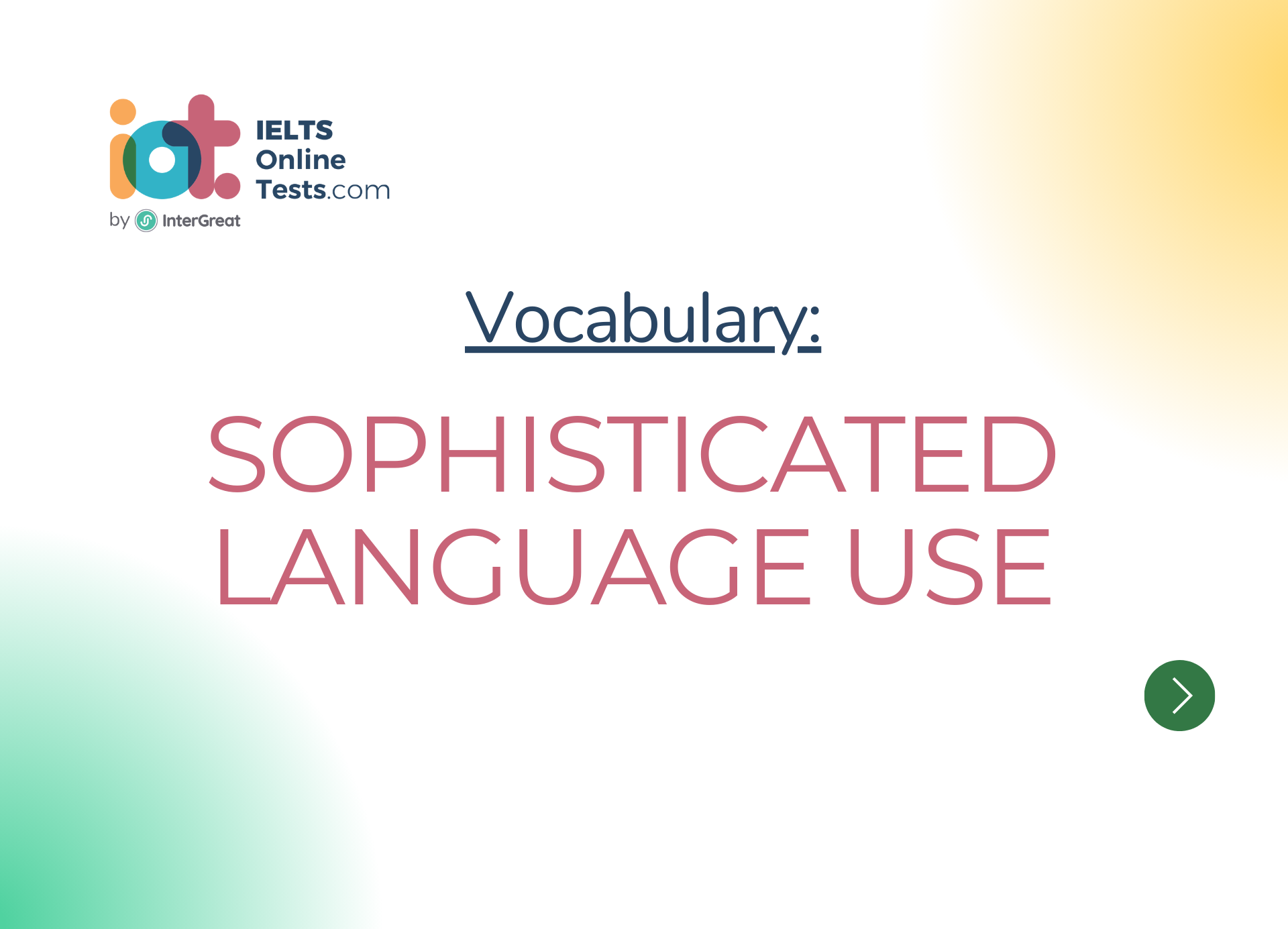
Sophisticated language use
Sophisticated language use is essential for achieving a higher band score in the IELTS exam. Here are some advanced vocabulary and language features that can help you showcase a more sophisticated level of English:
Idioms and Phrasal Verbs:
Incorporate idiomatic expressions and phrasal verbs to add depth to your language. For example, "hit the nail on the head" (to be exactly right) or "set off" (to start a journey).
Collocations:
Use natural word combinations that native speakers commonly use. For instance, "take into account" (consider), "a wide array of" (a variety of), "significant impact" (important influence).
Figurative Language:
Include metaphors, similes, and personification to create vivid imagery. For example, "His words were a soothing balm for her wounded soul."
Complex Sentence Structures:
Utilize subordinate clauses, relative clauses, and other sentence structures to show a higher level of syntactic complexity. For instance, "Despite the heavy rain, they decided to proceed with the outdoor event, which had been meticulously planned."
Advanced Adjectives and Adverbs:
Employ descriptive words and adverbs to enhance your writing and speaking. For example, "impeccable," "intriguingly," "profoundly," "exquisite."
Formal Register:
Use a formal tone and academic language appropriate for essays and reports. Avoid colloquialisms and slang.
Precision in Vocabulary:
Select words that precisely convey your intended meaning. Consider using specific nouns and verbs instead of general ones.
Cohesion and Coherence:
Organize your ideas logically and use linking words to connect sentences and paragraphs. This will make your writing coherent and easier to follow.
Hedging:
Employ hedging expressions to show a nuanced understanding of a topic, such as "it could be argued that," "studies suggest that," "there is evidence to support."
Succinctness:
Aim for conciseness in your writing and speaking while still expressing ideas effectively.
Euphemisms:
Use mild or indirect expressions to discuss sensitive or unpleasant topics. For example, "passed away" instead of "died," or "economically disadvantaged" instead of "poor."
Causal Language:
Demonstrate an understanding of cause and effect relationships using phrases like "as a result," "due to," "consequently," and "therefore."
Emotive Language:
Employ words and phrases that evoke emotions and create a strong impact on the reader or listener. For instance, "heart-wrenching," "thrilling," "compelling."
Qualifying Statements:
Show a nuanced understanding of complex issues by using qualifiers like "partially," "to some extent," "in some cases," or "subject to change."
Rhetorical Devices:
Skillfully use rhetorical devices like parallelism, repetition, and rhetorical questions to persuade and engage the audience. For example, "Ask not what your country can do for you; ask what you can do for your country" (John F. Kennedy).
Idiomatic Expressions:
Incorporate idioms and expressions that are unique to the English language to add flair and authenticity to your communication. Examples include "break a leg" (good luck), "hit the nail on the head" (correct), and "the ball is in your court" (your turn to act).
Figurative Language:
Use metaphors, similes, and personification to create vivid and imaginative descriptions. For instance, "Her smile was a ray of sunshine," or "The city never sleeps."
Subjunctive Mood:
Demonstrate advanced grammar skills by using the subjunctive mood to express wishes, suggestions, or hypothetical situations. For example, "I wish that he were here" or "It's essential that she be on time."
Irony and Satire:
Employ irony and satire to convey a message indirectly, often with humor or sarcasm. This requires a deep understanding of cultural references and context. For example, "Sure, I love waking up early on weekends," said no one ever.
Formal Language Register:
Display the ability to use appropriate formal language in academic or professional contexts. Avoid contractions (e.g., can't, won't), colloquialisms, and slang. Instead, opt for more formal alternatives.
Remember to practice incorporating these sophisticated language features into your English communication regularly. Reading books, articles, and academic texts can also help expose you to advanced vocabulary and language structures. With consistent effort and practice, you can improve your language skills and excel in the IELTS exam. Good luck!




